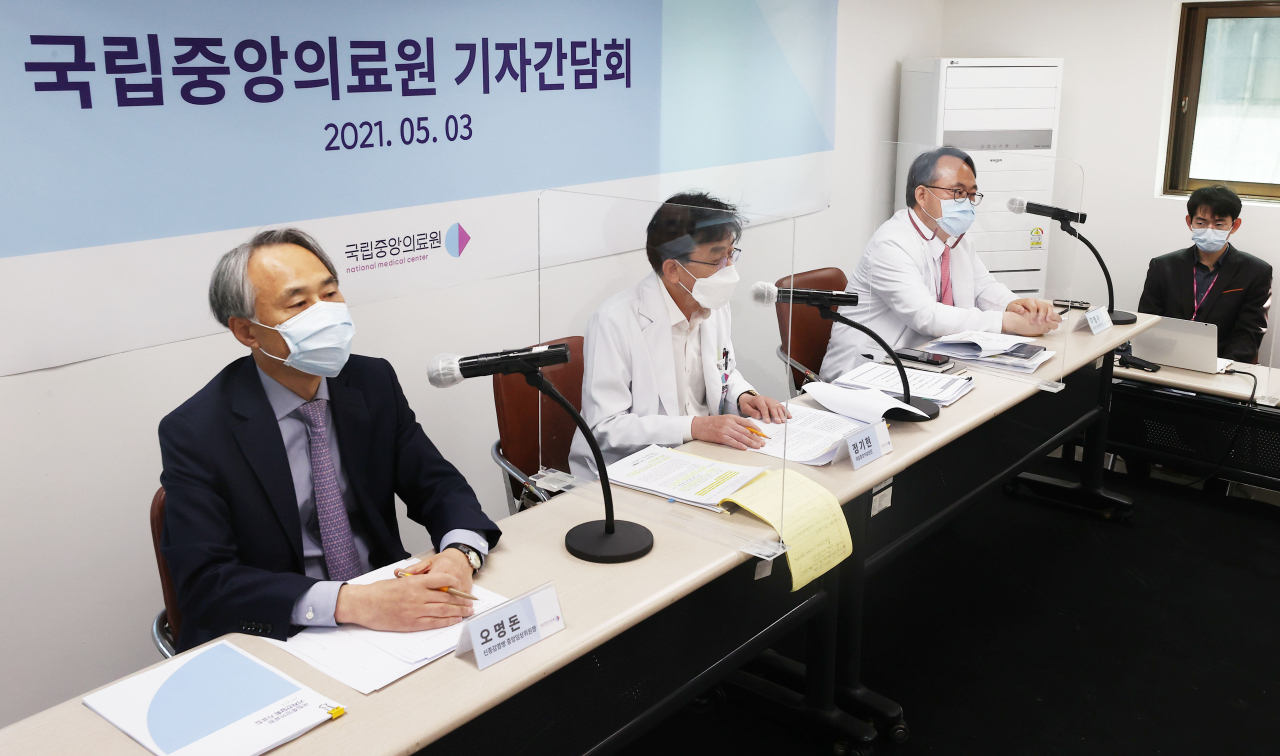 |
Dr. Oh Myoung-don (left) speaks during a news conference Monday morning at a National Medical Center building in central Seoul. (Yonhap) |
Korea probably won’t get to herd immunity by November as promised by the government, but “some degree of normal” is likely once vulnerable groups are covered, an infectious disease expert at the National Medical Center said Monday.
“Even after 70 percent of Koreans are vaccinated, there might not be herd immunity as we know it,” Dr. Oh Myoung-don, who is leading the state hospital’s clinical committee for emerging infectious diseases, told a news conference.
Oh said the classic idea of herd immunity, which is when a certain percentage of the population becomes immune to an infection and the chain of transmission stops, may need to be “redefined” with COVID-19.
“The understanding among experts in and out of Korea is that the novel coronavirus will probably become endemic like influenza,” he said. “To put it simply, COVID-19 may never go away.”
He went on, “It’s important that the public understands that the goal of immunization efforts is protecting those facing greater danger of death and hospitalizations, rather than eliminate the disease.”
As chief reasons for believing COVID-19 can’t be eliminated, he cited the uncertain durability of immunity acquired through vaccine or infection and the emergence of more transmissible variants.
That being said, Oh said the government messaging of a 70 percent vaccination rate as a return to normal could be misleading.
“Many Koreans are counting on the much-publicized goal of herd immunity by November to happen, and expect at that point social distancing and face mask wearing will be forgone, and travels will resume,” he said.
“But the estimate for the herd immunity threshold is continually shifting. The 70 percent vaccination rate goal is not a fixed range. It might need to be higher at 80 or 85 percent -- but a more honest answer would be that we don’t know,” he said.
Still, he said “some degree of normality” could be possible, such as small-scale maskless gatherings outdoors for those who are fully vaccinated.
With the long-term presence of the virus in mind, Korea may consider switching to a “damage control” strategy, he said. “Unfortunately, I don’t know what the government plan is on that front.”
Meanwhile, a shortage of supplies has led to vaccinations coming to a halt in Korea. Appointments for those eligible for the shots in the second quarter have been postponed indefinitely. Only 1,862 doses of either the AstraZeneca vaccine or the Pfizer vaccine were administered in the 24 hours ending Sunday at midnight.
On the shortage issue, the hospital’s director, Dr. Chung Ki-hyun, said he was “not in the position to comment,” but called for efforts to facilitate distribution.
“Right now our top priority has to be getting the vaccines to people who need the protection most,” he said. About 6 percent of the over 51 million people in the country have received at least a single injection as of Sunday.
By Kim Arin (
arin@heraldcorp.com)




![[Herald Interview] 'Trump will use tariffs as first line of defense for American manufacturing'](http://res.heraldm.com/phpwas/restmb_idxmake.php?idx=644&simg=/content/image/2024/11/26/20241126050017_0.jpg)

![[Health and care] Getting cancer young: Why cancer isn’t just an older person’s battle](http://res.heraldm.com/phpwas/restmb_idxmake.php?idx=644&simg=/content/image/2024/11/26/20241126050043_0.jpg)

